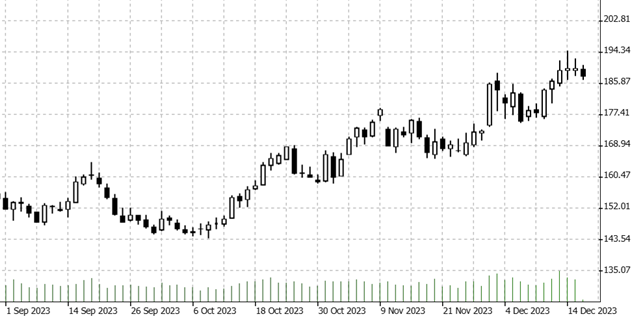

18.12.2023 –While the Robusta variety, which tends to be sold in supermarkets, is experiencing a small price run, the more noble Arabica variety is taking a back seat. We shed light on the background.
Robusta has just climbed to a new five-month high. The bulls are taking a breather in Arabica, here is the daily chart..

Source: Bernstein Bank GmbH
This is the background. While Robusta farmers in Vietnam and Brazil are holding back stocks and betting on further price rises, Arabica came under pressure from news from Brazil.
News from Brazil
The Brazilian producers’ association Conab has just raised its estimate for the 2023 harvest – by 700,000 to 55.1 million bags. At least the price is still being supported by the drought: the weather service Somar Meteorologia recently announced that the important growing region of Minas Gerais had recently only received half the average amount of rain. Minas Gerais accounts for around a third of Brazil’s Arabica production, as the website “Barchart.com” explained.
Mixed factors
The medium-term fundamentals are otherwise mixed. On the bullish side, the commodity exchange Intercontinental Exchange recently reported a 24-year low for Arabica beans in its co-operating warehouses.
On the bearish side, exports are picking up, as the International Coffee Organisation (ICO) recently announced. Global exports of all varieties rose by 0.9 per cent year-on-year to 9.53 million bags. The Brazilian Ministry of Trade had already reported an increase of 8.5 per cent to 235,000 tonnes on 1 December. Honduras had even reported an increase of 63 per cent to around 110,000 bags for November.
Millennials keen to experiment
Finally, let’s try to make a long-term forecast. We suspect that the easing, but still high inflation in the western world is likely to drive buyers towards the cheaper Robusta variety in the coming months. And that Arabica is more likely to suffer a setback.
The market researchers at Coherent Market Insights, on the other hand, expect rising prosperity in the emerging markets to boost demand for premium brands and speciality coffees in particular. Millennials in particular are curious about new things. At the same time, sales of fast products such as instant coffee and capsules will also increase. All in all, spending on coffee in India and China is expected to increase by more than 15 per cent. We look forward to seeing how things develop – and will keep you up to date!
___________________________________________________________________________________________________________________________________________________________
The content of this publication is for general information purposes only. In this context, it is neither an individual investment recommendation or advice nor an offer to purchase or sell securities or other financial products. The content in question and all the information contained therein do not in any way replace individual investor- or investment-oriented advice. No reliable forecast or indication for the future is possible with respect to any presentation or information on the present or past performance of the relevant underlying assets. All information and data presented in this publication are based on reliable sources. However, Bernstein Bank does not guarantee that the information and data contained in this publication is up-to-date, correct and complete. Securities traded on the financial markets are subject to price fluctuations. A contract for difference (CFD) is also a financial instrument with leverage effect. Against this backdrop, CFD trading involves a high risk up to the point of total loss and may not be suitable for all investors. Therefore, make sure that you have fully understood all the correlating risks. If necessary, ask for independent advice. CFDs are complex instruments and are associated with the high risk of losing money quickly because of the leverage effect. 68% of retail investor accounts lose money trading CFD with this provider. You should consider whether you understand how CFD work and whether you can afford to take the high risk of losing your money.7
